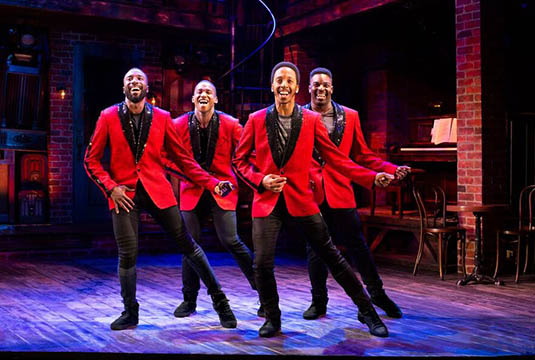by JK Clarke
The upside to Elevator Repair Service’s (ERS) latest production, Fondly, Collette Richland (written by Sibyl Kempson and playing at the New York Theatre Workshop), is that the audience is very quickly made aware that they are seeing an abstract and severely meta production when Collette herself (April Matthis) walks out on stage with a title card bearing the name of the play and holding a microphone through which she tells us warmly, “Hello, I didn’t realize you had entered.” She’s dressed in festive, tropical colors, sporting large, pink-framed sunglasses and looks as if she’s about to board a cruise ship. She’s our Chorus, of a sort, setting a scene, then handing the story off to a piano-playing narrator (Mike Iveson, who plays quite nicely). Everything about this play is evaluative, telling us what we’re about to see, what we’re seeing and what we’ve seen. Oddly enough, while we’re seeing the actual action, it makes little sense. “We were paying attention,” Collette says, “but in the wrong way.”
ERS goes so far as to include in their playbill a brief list of definitions—“resurgent,” “resurgence,” “Relevation”—the last of which refers to a philosophy, of sorts, brought into prominence by David Bohm, a twentieth century theoretical physicist. Like some of the literary movements of the early 20th century, particularly in Europe (the nouveau roman, or “new novel,” for example), it’s an examination of what lurks just below the surface of reality, what French anti-novelist Nathalie Sarraute referred to as the sous-conversation (the unspoken “underneath discussion”). And that quite often manifests, as it does in Fondly, Collette Richland, as a garbled storyline and dialog that frequently veers into gobbledy-gook: near misses of actual language, perhaps in place to illustrate the banality of life and language, or perhaps just to proximate the nonsensical slant that sometimes dreams take.
Fondly, Collette Richland starts out in traditional household setting of the 1950s, with a husband coming home after a long day to a dinner prepared by an apron-wearing wife (Laurena Allan as Mabrel Fitzhubert who spouts trite little quips like “eat to live, don’t live to eat,”) when they are interrupted by a knock at the door from Local Representative Wheatson (played with depth and feeling by Greig Sargeant). We don’t know who or what he represents or why he’s there, and that’s par for the course in this play. Other characters drift in and out, some looking like Amelia Bedelia (Kate Benson as Winnifr’d Bexell), some like socialites who would seemingly have no place interacting with the characters we met in the first scene. Then somehow the action moves to a grand hotel in the Alps. Where, what and how the plot develops is perplexing and . . . immaterial. Isn’t that the point, anyhow?
One could argue that the hyper-analysis and deconstruction of traditional or mainstream theater is meaningless for a public audience if it fails to entertain. And that was the problem with this play, which evoked lassitude rather than inspired thought. What a shame, too, for Elevator Repair Service is loaded to the brim with dynamic, smart actors. They are an incredibly clever company, able to stage verbatim productions of great novels like The Sound and the Fury and The Great Gatsby—heretofore unthinkable feats—in a relatable, entertaining manner (I, for one, finally “got” The Sound and the Fury when I saw their performance after many labored readings on my own). And the stagecraft is innovative and inspired, beautifully demonstrated here by Ben Williams’ cacophony of transportive soundscapes.
I like theater of all varieties and can even appreciate it when it’s poorly done (provided a sincere attempt was made). But here I felt like I (and the rest of the audience) was the butt of an inside joke: “watch them pretend to intellectualize this!” Walking out I wasn’t disappointed or confused. Instead, I was angry. Angry that my time could’ve been better spent: at another play or simply at home, doing nothing. Director John Collins handled the material adeptly, and the dialog was sharp in its own context; but the overarching problem was the concept itself.
If you’re reading this review, you’re probably already the kind of person who has no interest in seeing Fondly, Collette Richland. It’s an inside job, a show where snarky academics and performance artists can nudge each other (or themselves) and give a knowing wink, happy to be so much smarter than everyone else in the room. That accounts for less than one percent of the audience. Then there’s another two to three percent who are pretending to know what’s going on, lest they feel left out or look stupid. The rest of the audience is just bored, nodding off or checking their watches to see if the interminable first half of the show is ending any time soon so they can catch the nearest cab, bus or subway and go . . . anywhere. People who dwell in the world that this sort of theater appeals to find each other and are already aware of the experiments going on. They’re usually already a part of it. But it’s simply not a play for people who enjoy a relaxing, or even mildly engaging, night at the theater.
Fondly, Collette Richland. Through October 18 at the New York Theatre Workshop and presented by the Elevator Repair Service (79 East 4th Street between The Bowery and 2nd Avenue). www.nytw.org
*photos by Joan Marcus

























